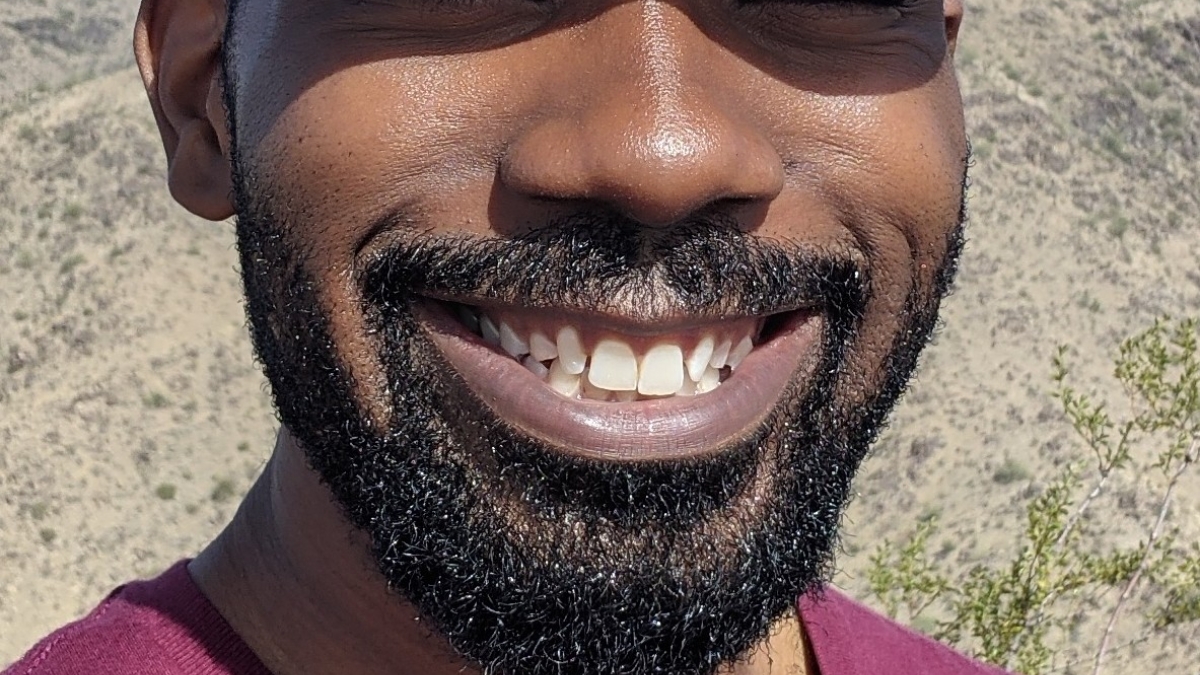Editor's note: This story is part of a series of profiles of notable spring 2022 graduates.
Ed Buie II has always had a passion for math and physics, and this interest was fostered at a young age when his dad gave him a copy of Steven Hawking’s “A Brief History of Time.”
This spring, Buie will graduate with a PhD in astrophysics from Arizona State University’s School of Earth and Space Exploration.
As an undergraduate, the Michigan native attended Michigan State University, originally as an accounting major, but soon discovered this wasn’t the path for him. In his second year at MSU, he changed his major to astrophysics. On the recommendation of his undergraduate adviser, Buie applied to ASU for graduate school.
“I had no intention to live in a desert, but that's where I ended up,” said Buie. “It’s funny how life works out.”
Buie was awarded a five-year NSF Graduate Research Fellowship for his research. To other students still in school, he recommends they “take advantage of the resources available to you and learn as many skill sets as you can.”
During his time at ASU, Buie worked with Professor Evan Scannapieco on investigating the role of turbulence in galactic halo simulations using the MAIHEM (Models of Agitated and Illuminated Hindering and Emitting Media) code, which tracks ionizations, recombinations and ion-by-ion radiative cooling for many astrophysically relevant elements.
“Ed is a dedicated and thoughtful astrophysicist who continuously works to improve access and excellence in science. He is wonderful to work with, and he approaches his research work by setting his goals high and maintaining the strong focus and willingness to develop the skills he needs to achieve them,” said Scannapieco, a professor in the School of Earth and Space Exploration (SESE). “He’s also a natural leader who has helped establish several new initiatives to make our school more inclusive and equitable. It is no overstatement to say that his presence in SESE has improved all of our lives.”
Buie’s role to support and influence others will continue well beyond graduation. This summer he will drive across the country to New York, where he will begin a faculty position at Vassar College supporting students in their journey of learning.
“Ed and his career are off to a fantastic start,” said School of Earth and Space Exploration Professor Hilairy Hartnett. “He’s an incredible advocate for equity and inclusion in STEM and for better science communication. I’m super excited to hear about all the innovative teaching and research in his new role at Vassar.”
Buie shared a few thoughts about his time at ASU.
Question: Which professor taught you the most important lesson while at ASU?
Answer: This is hard because I learned so much from many professors. I can name a few: Hilairy Hartnett, Christy Till, Evan Scannapieco, Chris Groppi, Kimberly Scott, Jnaneshwar Das and Danny Jacobs.
Q: What’s something you learned while at ASU — in the classroom or otherwise — that surprised you or changed your perspective?
A: I didn't learn this at ASU, but during my time here: People should be focused on figuring out the role that they want to fill in the world. Ask yourself, is there something that currently exists that you want to add to, or create? I realized early on, I am most fulfilled by supporting others, so I do things that align with that support role. If you know what role you'd like to fill in the world, things get easier and seem to fall into place.
Q: If someone gave you $40 million to solve one problem on our planet, what would you tackle?
A: I think I would use this to start a martial arts fund to pay for kids to practice a martial art in their nearby area (and support travel) whether that be karate, jiu jitsu, taekwondo or any other kind of dojo. Having practiced martial arts for a bit over two years now, the right dojo will teach you many lessons that are applicable in the outside world that would ultimately make the world a better place, in my opinion. These lessons include patience, diligence, perseverance, respect and kindness.
Q: Any influences from past teachers, friends, family?
A: I've been lucky enough to have learned something valuable from everyone I've met. Maybe the biggest influence was my senior thesis adviser telling me to be a sponge in graduate school, which has enabled me to be influenced by everyone. This also includes the bad influences, which taught me what things not to do and choices to not make.
Q: Did you face any challenges to finish your degree with a pandemic?
A: Not challenges with my degree, but personal things outside of school that ultimately led to better outcomes than I could've imagined. It's important to reflect and move forward with those learned lessons.
Q: Goals for the future?
A: I want to keep supporting others in any way that I can. I want to help transform people's lives, communities and cities. The ultimate goal for me is to add as much good to the world as I can during my lifetime.
More Science and technology

ASU-led space telescope is ready to fly
The Star Planet Activity Research CubeSat, or SPARCS, a small space telescope that will monitor the flares and sunspot activity…

ASU at the heart of the state's revitalized microelectronics industry
A stronger local economy, more reliable technology, and a future where our computers and devices do the impossible: that’s the…

Breakthrough copper alloy achieves unprecedented high-temperature performance
A team of researchers from Arizona State University, the U.S. Army Research Laboratory, Lehigh University and Louisiana State…


